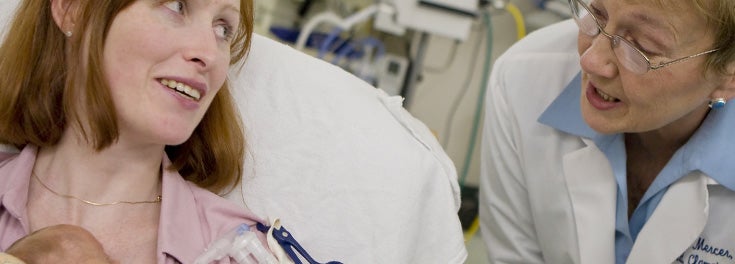
The simplest ideas often have the biggest impact. Professors in the College of Nursing, for example, have shown that taking uncomplicated, low-tech steps in in a baby’s first moments and throughout a child’s journey to young adulthood can mean improved brain development and better overall health.
Mary Sullivan, professor and interim dean of the College of Nursing, has proven that a nurturing and stimulating environment at home and school can mitigate the physical and intellectual delays that may result from a child’s pre-term birth. In the country’s longest running research study of its kind, Professor Sullivan has followed the same children from their pre-school days to college and beyond. Her findings, which have been shared throughout the U.S. and Europe, are the result of $7 million in funding from the National Institutes of Health’s (NIH) National Institute of Nursing Research.
This brilliantly simple idea has received millions of dollars in research funding from the National Institutes of Health, the National Institute for Nursing Research, and the Bill & Melinda Gates Foundation.
While Professor Sullivan takes the long view, Professor Judith Mercer looks at a baby’s first moments. Her research shows how a simple delay in clamping the umbilical cord may improve a baby’s health. Teaming with Assistant Professor Debra Erickson-Owens, Professor Mercer has proven that delaying cord clamping for pre-term infants pays huge dividends in brain development and overall health for those babies.
In this country, the practice has long been to cut the umbilical cord immediately after birth. But Professors Mercer and Erickson-Owens believe delayed clamping allows the newborn to absorb more oxygen- and stem-cell-rich blood from the mother’s placenta. This brilliantly simple idea has received millions of dollars in research funding from the National Institutes of Health, the National Institute for Nursing Research, and the Bill & Melinda Gates Foundation.
Professor Mercer, a certified nurse-midwife, said she had thought for years that a delay in cord-clamping could do wonders for a baby, especially one born prematurely. In fact, her research found that premature babies whose cords were clamped after a 30 to 45 second delay had significantly lower rates of bleeding in the brain and blood infections—two occurrences associated with developmental delays and conditions such as cerebral palsy.
Her research has eliminated previous concerns about delaying the cord clamping and has changed many standard practices. And now, NIH wants her to find out if doing the same thing for full-term babies will also result in health benefits. So, Professors Mercer and Erickson-Owens are working with Women & Infants Hospital and Brown University’s Advanced Baby Imaging Lab in the latest study. Using the imaging lab’s MRI technique, considered revolutionary in observing infant and child brain development, full-term babies are scanned at four, 10, and 24 months to determine if delaying clamping results in myelination in the brain. Iron is required for the process of forming myelin sheaths around the brain. Good myelin sheaths allow impulses to move more quickly and are critical to a healthy nervous system.
“The fact is that cord blood contains stem cells, the body’s master cells that help it renew and repair its tissues. They are miraculous. We don’t know enough about them yet, but we arrogantly oftentimes cut that cord right away,” Professor Mercer says. “If research continues to support delayed cord clamping and medical personnel perform this procedure, the effects may be well beyond the newborn. It’s all about timing. This is a low-tech change in clinical practice that respects the normal process of birth and makes a big change in outcome.”
Pictured above: URI Professor Judith Mercer with a new mom and her baby.
Related links
Baby Talk: Unlocking the Secrets of the Baby Brain, a documentary showing the lasting effects of exciting research from URI Professors Sullivan and Mercer, premiered on Nov. 14 on WSBE Rhode Island PBS.
